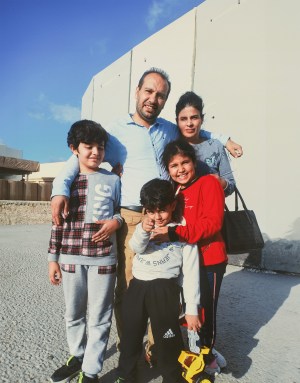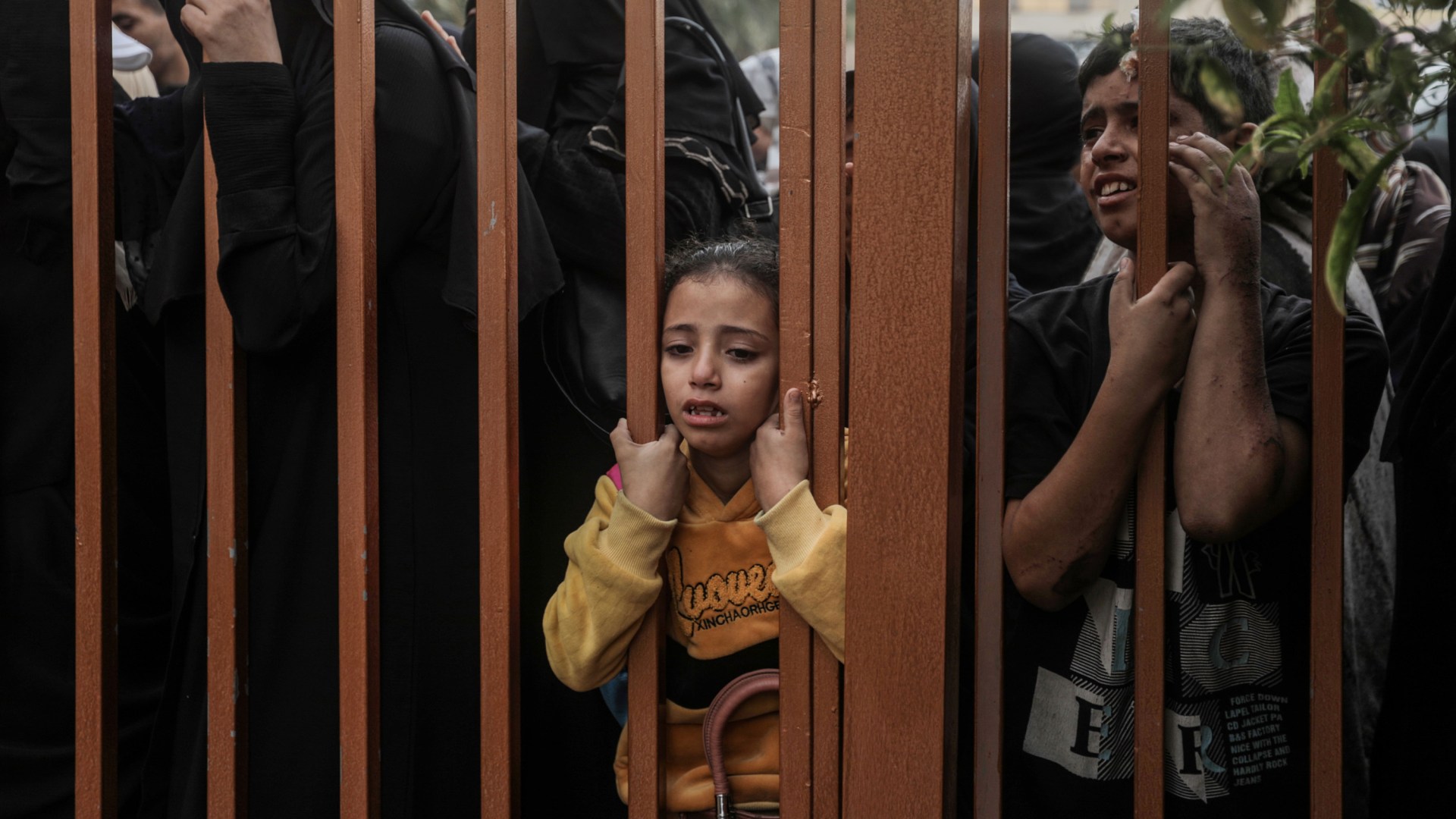Janet Maher is out of Gaza.
The Palestinian wife of the Egyptian former pastor of Gaza Baptist Church had been sheltering in the Saint Porphyrius Greek Orthodox Church with her three children and 350 others—but not her husband. Two weeks before the October 7 Hamas terrorist attack on Israel, Hanna Maher had traveled temporarily back to Egypt, where he had to remain after the war broke out.
Despite the horrors of suffering 43 days of bombardment by herself, as CT previously reported, the family separation is the reason why Janet and her children are now safely in Egypt, reunited with Hanna. But first they had to undergo a harrowing journey that began with tearful goodbyes to a hallowed community.
“I spent weeks with these people and am broken by the experience,” Janet said. “But everyone pleaded: If you get out, tell the world about our situation.”
The death toll in Gaza exceeds 11,000, including more than 5,000 children, according to statistics released by the ministry of health in the Hamas-run enclave and last updated November 10. But save for the shrapnel and scattered remains of human carcasses flying over the walls of the church compound, little of this was known to the Christians inside.
With no television or internet and only intermittent connection to the cell phone network, Janet and her fellow sheltering Gazans knew only the daily reality of war. Most of the day was spent trying to figure out how to procure food, with the young men tasked with trips outside to the local market.
Most often, the day would begin with bombing—sending the people scurrying away from windows and doors to the center of the room. Three times a week, the priest would lead morning prayers. Frequently, they would gather for impromptu singing, simply to calm their nervous spirits. Some would read the Bible; others cried alone in the pews.
They would clean often. Dust and debris settled after every explosion, while most people suffered some form of illness—coughing, fever, stomachaches—with flies everywhere, flitting about from the corpses in the street.
With no breakfast or dinner, most daily meals consisted of lentil soup with occasional rice or macaroni. Water was seldom clean, though the clergy obtained some by trading available gasoline to the neighboring mosque, which used the fuel to run its well-pumping generator.
“Once, the priest was able to find chocolate,” Janet said. “It was like Christmas.”
But after eating around 4 p.m., the darkness settled. With no electricity, everyone moved to their mattresses for a fitful night of sleep. As 100 other people in the funeral hall of the church tucked in, Janet read Psalm 23 to her children. But she relied on the more militant realities of Psalm 91 to settle her own anxious thoughts.
“A thousand may fall at your side, ten thousand at your right hand,” Janet recited. “If you say, ‘The Lord is my refuge,’ and you make the Most High your dwelling, no harm will overtake you, no disaster will come near your tent.”
She has ample personal experience to prove it.
Before moving her family to the shelter, Janet left her apartment in search of food. Finding none at the market, she returned home. Five minutes later, a missile struck the facility, killing her neighbor. Shaken deeply by the tragedy, she also saw the hand of God in her protection.
But others were not so fortunate, even inside the church. At least 20 people died when an Israeli missile, which the Israeli Defense Forces (IDF) said targeted a Hamas command center nearby, struck just outside the church compound. Last week, an elderly man died when he ran out of medicine for his gall bladder, and a young man with a severe fever could not get to a hospital.
Seeking Hamas-held hostages, Israeli forces attacked the nearby al-Shifa Hospital.
That news had prompted Hanna Massad, the Palestinian former pastor of Gaza Baptist Church before Maher, to reach out to two church elders taking shelter in the Holy Family Catholic Church, with whom he maintains near daily contact. Asking about two Christians who were going to al-Shifa three times a week for kidney dialysis, he learned of their relocation south in search of a functioning hospital.
And despite doctors and pharmacists sheltering at the church, an elderly man there passed away.
“Every day is worse than the day before,” Massad reported. “And if you have a serious illness, most likely you will die.”
Life inside is full of worry—but also encouragement. It is slightly better inside the church than outside, he said, and everyone tries to help one another. They have adopted the status of Noah’s ark, Massad continued. Though the waves of violence beat against their vessel, they feel protected by the blood of Jesus.
It is the same analogy Janet employed, but with a different application. Once their ark lands safely, she said, all they will find is death and destruction. Without the morbid conclusion, she had been telling this and other Bible stories to the sheltering children. Job, she communicated, had everything lost later restored by God.
But privately she felt like one of Job’s friends. Maybe the destruction of Gaza, she wondered, is God’s punishment on the Christians for their lack of spiritual devotion. No, sometimes things just happen, she rebuked herself. And when in fear, don’t worry about who to blame.
Now outside, she has had more time to reflect.
“Neither Israel nor Hamas care about us,” Janet said. “Muslims and Christians are not guilty of anything, and the innocent people are dying.”
Israel would say otherwise. Janet’s brother is among several who received phone calls from the IDF, telling them to go south for safety. And she says the message came with a semi-threat: If anyone from Hamas enters the church, it will be bombed.
Unable to sleep anyway, Christians inside Saint Porphyrius set up a nighttime vigil. And once, Muslims from the mosque came to help them beat away several strangers who tried to force their way inside. On other occasions, they fought off attempts at theft, as hungry individuals imagined the Christians might have more food than they did.
Some Muslims continue to shelter inside, as the church shares with neighbors what it can.
The religious fraternity is largely local, however. Janet’s brother told the IDF that Christians have no relatives in the south, and there are no churches to receive them. She noted that southern Muslim women cover their hair, and the men there have little experience dealing with other faiths.
Fanaticism is said to have stronger roots outside the capital, Gaza City.
“They won’t kill us, but they don’t understand us,” Janet said. “It is a different culture, and we don’t know what their reactions will be.”
Gazan Christians roughly number 1,000 people and largely live in the vicinity of the three churches, all in the capital. When Hamas took over the coastal enclave in 2007, that April the community—which then numbered about 7,000—suffered a bomb attack at the Palestinian Bible Society, and in October the manager of its bookstore was murdered. Hamas condemned the incidents and promised investigations, but no one was brought to justice.
By the time Hanna became pastor in 2012, the Christian population had dwindled to about 3,000. A cross-Palestine survey in 2020 found that 60 percent of Christians considering emigration were doing so for economic reasons. But while only 7 percent cited security conditions, 77 percent were worried about the presence of austere Salafi Muslims and 69 percent were worried about armed factions like Hamas.
But 83 percent feared being driven from their homes by Jewish settlers, while 62 percent believed Israel’s goal was to expel Christians from their homeland.
Somehow, none of this has impacted her children—Mathew age 10, Natalia age 9, and Timothy age 5—even during the bombings, as she pulled their mattresses away from the windows.
“No one could sleep, except my kids,” Janet said. “I was astonished by their sense of peace.”
The youngest son would sometimes sense fear in his mother, she said, and take her hand to remind her that God would protect them.
And all the while, his father was making phone calls.
In contact with the Egyptian embassy in the West Bank capital of Ramallah, Hanna also pressed his Presbyterian Synod of the Nile in Egypt to intercede on his family’s behalf. His hope surged as the Rafah border between Gaza and Egypt opened temporarily to allow some to leave, only to collapse again when it shut once more. But the task was complicated, because while his children had Egyptian citizenship, Janet did not.
Last Thursday she received word that all three of her children were on the exit list. The next day she set off to the border with her parents included, as her mother—a cancer patient at the Turkish hospital in Gaza—was promised transfer to Turkey, accompanied by Janet’s father.
Later that day Janet learned her name was also added to the exit list. But how could a single mother get there—in the middle of a war zone—with three young children and elderly parents, one of which was in a wheelchair?
“There were many steps, and it was very difficult,” she said. “And very risky.”
Finding transportation was the first challenge. They had aimed to leave at 9 a.m., but the only ride available was found two hours later: a dilapidated vehicle arranged by a friend. It took them as far as the Salah al-Din highway, the main artery running north to south.
There they found a donkey cart that took them to the Israeli checkpoint.
Passing through on foot with hundreds of others, they ambled for an hour as the wheelchair broke along the way. Two young Gazan men volunteered to carry the still-seated grandmother until they reached an IDF stopping point. Other young men were pulled out from the crowd, and thereafter disappeared. Families were separated in the chaos as military personnel told them to run; elderly people fell and were left behind.
Dead bodies were strewn along both sides of the road.
Janet recalled how at an informal checkpoint, they and all the others were told to kneel in a bombed-out crater, and Janet raised a white cloth above her head. A bulldozer was dumping sand in front of them—presumably to make a security barrier—but the children thought they would be buried alive. Four hours later, they were all permitted to continue south.
Janet said she was fortunate to have cash for a taxi. She paid 500 shekels ($133 USD) for what would usually be a 30-shekel ($8) 20-minute ride to the border, only to find it closed. Fortunately, the driver was willing to drop them off at the Turkish cancer hospital in Khan Yunis, six miles back.
Finding no room at the inn, the family was allowed by the hospital to stay in the waiting room because the grandmother was a patient. After a sleepless night, Janet’s brother called a local Muslim friend to get them another taxi to the Rafah border crossing.
There, they found both good and bad news. Janet’s and the children’s names were posted on the exit list on the wall. Her parents’ names were not. Though their names had been submitted by Turkey, Israel had not yet processed cancer patient transfers, Janet said. And discovering that, somewhere back, her mother had lost her cell phone, she asked her brother to make arrangements for the parents to stay somewhere locally.
There was nothing to do but go on without them.

On the other side of the border, Hanna waited anxiously, no longer able to contact his family because they’d left Janet’s cell phone with her parents. He had already lingered all day in Rafah on Friday, only to be told by security that, as a pastor, it was not safe to stay overnight. The Sinai Peninsula has historically been a hotbed for underground Salafi Muslim extremist cells.
Hanna went back 30 miles westward to Arish, returning the next morning.
Inside the border crossing there was a mass of humanity, as foreign passport holders submitted their documents. Dozens of embassy personnel waited on the other side, ready to receive them. Janet and the children were the first Egyptians to exit, Hanna said, as the synod had followed her case to conclusion.
“Someone in the office told me: Many people have been calling me about you,” Janet said. “But what about the others, who have no one to help them?”
As they exited, Hanna saw a woman with children within the crowd—but they were so haggard and pale that he did not recognize them as his own until they were about 15 feet away. And then he shouted with joy, with tears and hugs all around.
But there was still work to do. Hanna joined the synod’s government-coordinated outreach to southern Gaza Palestinians exiting through Rafah, and, with Janet, dropped off some blankets to those shivering in a shelter. Their appearance drew surprise, and a hint of distaste.
How can you accept help from an uncovered woman? one asked her friend. Others were shocked yet reluctant to receive aid from Christians, having equated them with the actions of Israel and the United States.
Continuing 90 miles west along the Mediterranean Sea, Janet finally had rest with her family at Hanna’s sister’s house in Ismailia, 30 miles further south along the Suez Canal. And there she cried, thinking about those still sheltering at Saint Porphyrius church.
And now—finally back home in Cairo—she has told their story.
“What about my brother and sister?” Janet asked. “How can they get out?”
At first, the community had great resolve to stay put and wait out the war. Janet said word circulated that the Greek Orthodox bishop told the IDF he would not be the one who empties Gaza of its Christians. Their chapel is named after the fourth-century saint who evangelized the local pagans.
One voice from the Catholic shelter is emblematic.
“We do not accept displacement from our country, our land, and our churches,” stated Diana Tarazi. “I will not leave the church except to the grave.”
But about two weeks ago, as food and fuel began running out, the emotional toll became increasingly hard to bear, Janet said. And as word filtered out to the world at large, some proposed that Israel facilitate Christian movement to the West Bank—where many Gazans have relatives.
“Even if Israel agreed, this would make the Christian community not look good in front of their Muslim neighbors,” Massad said. “But I’m starting to change my mind.”
His own resolve as a Gaza Palestinian wavered after speaking to church elders.
In the West Bank, however, Jack Sara’s has not.
“Christians are part and parcel of the Palestinian people,” said the president of Bethlehem Bible College. “They were never threatened as a community by their own people, and I doubt they want to receive special treatment.”
Doing so would breach trust, community peace, and gospel witness. If Israel really wants to help them, Sara said, let them return to their original homes prior to their 1948 displacement to Gaza, in Israeli cities like Jaffa, Majdal, and Beersheba.
Israeli ministers have asked instead—denied as government policy—for Arab and Western nations to receive Gaza refugees.
Janet compared the situation to Daniel’s night in the lions’ den: God is protecting them but has not yet removed the lions. She understands the problem if Christians receive special treatment, as well as the problem of a Gaza with no Christianity.
But the people are desperate, she said. Her prayer is that the war would stop, for which she says there are also no easy answers. But she also prayed for her mother to get to Turkey—and there her mother is now, finally processed through the embassy.
And if her prayer for peace fails, she asks God that the Christians can leave.
“If we don’t die by Israeli bombing, we will die from lack of food and medicine,” Janet said. “Christians in Gaza want to get out, wherever they have to go.”













